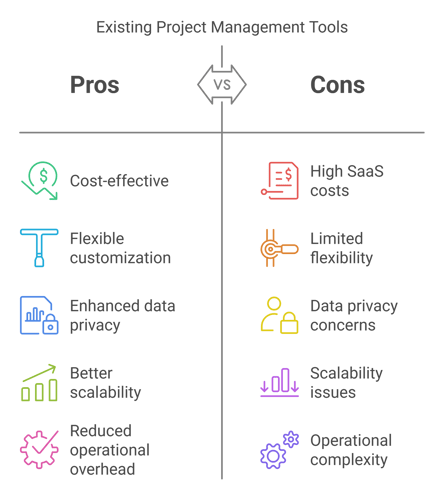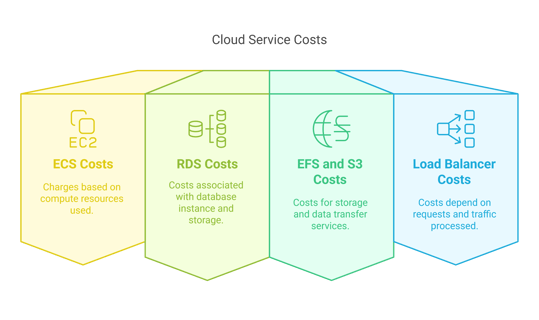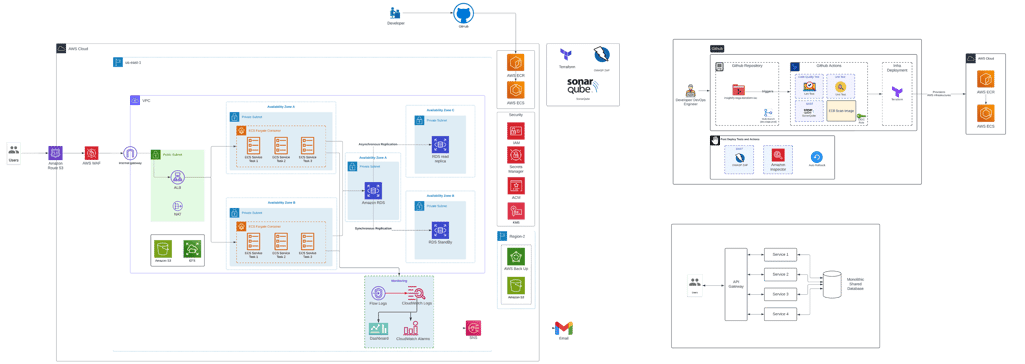Case Study: Project Management Platform Using AWS Services
This case study highlights the implementation of a self-hosted Taiga project management platform using AWS services, providing a scalable, secure, and cost-effective solution. The architecture leverages AWS ECS, RDS, and other services to ensure high availability, flexibility, and customization for growing teams and projects.
2/11/20256 min read

Project Management Platform Using AWS Services
Client Overview: A software development firm was facing several challenges with existing project management tools. These tools, while functional, were expensive, lacked the flexibility needed for the growing operations, and didn’t allow the level of customization required by the firm. Additionally, the data privacy concerns associated with using third-party solutions were increasing, along with the scalability and performance issues as the firm’s projects expanded. They needed a customizable, secure, scalable, and cost-effective solution that would allow them to manage multiple projects efficiently, with enhanced flexibility and control over their data.
Problem Statement:
The client identified several key pain points with their existing project management tools:
High SaaS Costs: The subscription-based project management tools were becoming prohibitively expensive, especially as the team size grew. Many advanced features were locked behind higher pricing tiers, creating an additional financial burden as the business expanded.
Limited Flexibility and Customization: The existing tools lacked the flexibility to meet the specific needs of the client’s agile development team. Many of the workflows were forced to adapt to the tool, rather than the tool adapting to the team’s existing processes.
Data Privacy and Control: The client expressed concerns over the security and privacy of their project data stored on third-party servers. The lack of control over how the data was accessed and stored posed a significant risk, especially for handling sensitive project information.
Scalability Issues: As the client’s projects grew in size and complexity, the existing tools struggled to scale efficiently. Performance bottlenecks became common when managing large backlogs or multiple projects, affecting overall productivity.
Operational Overhead: For teams interested in self-hosting, the task of setting up, managing, and maintaining the infrastructure became complex and resource-intensive.
Solution Overview:
In search of a more cost-effective and customizable solution, the client turned to Taiga, an open-source project management platform that supports Agile methodologies. However, to meet the client’s needs and expectations, the solution had to be self-hosted and scalable, offering greater control over their data and performance while reducing the reliance on expensive SaaS solutions.
To address these requirements, the project was developed using a set of AWS services, ensuring that the solution was both flexible and scalable. This allowed the team to have complete control over the infrastructure while benefiting from AWS’s robust capabilities for performance, security, and high availability.
Solution Description:
Infrastructure as Code (Terraform):
The solution was built with Terraform, an infrastructure as code (IaC) tool, to automate the provisioning of all AWS resources required to run Taiga. Terraform was used to define, deploy, and manage the infrastructure in a repeatable and scalable way. This approach allowed for a more consistent setup and automated resource management, reducing the chance for human error and ensuring that the infrastructure could scale with the growing needs of the business.
ECS for Deployment (Elastic Container Service):
To achieve smooth and consistent deployments, Taiga was containerized using Docker. The official Docker images provided by Taiga were used to ensure that the container setup was streamlined and met the platform’s requirements. The containers were deployed using Amazon ECS (Elastic Container Service), a fully managed container orchestration service. ECS was paired with Fargate, a serverless compute engine that eliminates the need for managing server infrastructure.
Fargate automatically handles the scaling and resource allocation based on the workload’s needs. This allowed the team to focus on their application without worrying about the complexities of manual scaling, server management, or underlying infrastructure.
RDS PostgreSQL for Data Management:
Data management was handled by Amazon RDS (Relational Database Service), specifically using PostgreSQL. Amazon RDS provides a scalable and highly available database service, which was crucial for the reliability and performance of Taiga.
To ensure high availability, the database was set up using Multi-AZ (Availability Zone) deployments, which allows for automatic failover to a standby instance in case of failure. This ensured that the system remained operational even during unexpected events. Automated backups with a retention period of seven days were configured to facilitate disaster recovery and ensure that the data was always recoverable in the event of data corruption or loss.
Real-time monitoring was enabled on the RDS instance to track critical metrics like CPU usage, disk space, and query performance. Fine-tuning of database parameters was performed to ensure optimal query performance and efficient resource utilization.
Load Balancing and Security:
To manage traffic efficiently, Amazon Application Load Balancer (ALB) was implemented. The ALB distributes incoming traffic to ECS tasks running on Fargate, ensuring that requests are routed to the appropriate containers. This setup optimizes the use of available resources and helps maintain a responsive application environment, even as user demand fluctuates.
For additional security, Network Address Translation (NAT) Gateway was configured to allow ECS tasks in private subnets to access external resources, such as updates or APIs, without exposing them directly to the internet. This ensures the system’s internal services remain protected from external threats.
File Storage (EFS and S3):
Storage management was handled using Amazon EFS (Elastic File System), which was utilized for persistent file storage across ECS tasks. EFS ensures that files are easily accessible across tasks, maintaining data consistency and enabling seamless collaboration between services. Amazon S3 was used to store static content and project files, providing scalable and durable storage for large assets.
Communication Between Services (AWS Service Connect):
To ensure smooth and secure communication between the different microservices running on ECS, AWS Service Connect was used. Service Connect enables seamless networking for microservices without the need for complex networking configurations. It ensures that Taiga’s services could interact with each other reliably and securely, supporting the overall performance and stability of the platform.
Scalability and Flexibility:
The entire setup was designed with scalability in mind. Using Terraform to manage infrastructure, ECS with Fargate for compute resources, RDS for data management, and the dynamic load balancing, the system is capable of scaling up or down in response to varying traffic demands. As user activity increases, ECS can automatically allocate additional compute resources to handle the load, ensuring that performance remains consistent and reliable.
Additionally, by opting for an open-source platform like Taiga, the solution was highly customizable. The client was able to adapt the platform to their specific needs without being constrained by the limitations of proprietary SaaS tools.
Architecture:
The architecture diagram below illustrates the components and services used in the solution.
Architecture Components:
Amazon Route 53: Handles DNS management, directing traffic to the Application Load Balancer (ALB) in the public subnet.
Amazon ALB: Balances traffic across ECS Fargate containers running in private subnets.
Amazon ECS with Fargate: Hosts Taiga containers, managed by ECS to automatically scale based on demand.
Amazon RDS (PostgreSQL): Provides a highly available and fault-tolerant database solution.
Amazon EFS: Manages persistent file storage across ECS tasks.
Amazon S3: Stores static content and backups for the platform.
AWS Service Connect: Enables seamless and secure communication between microservices running on ECS.
Solution Resolution:
Scalable Infrastructure: The solution successfully meets the scalability requirements of the client, with ECS and Fargate allowing for automatic resource scaling based on usage. The infrastructure can now handle the client’s expanding user base and growing project demands efficiently.
High Availability: The combination of ECS, RDS with Multi-AZ deployments, and automated backups ensures high availability for the Taiga platform. The setup can recover from failures quickly, ensuring minimal downtime.
Cost-Effective Customization: The use of an open-source platform, Taiga, significantly reduced costs compared to traditional SaaS tools. Moreover, the flexibility of AWS services enabled the client to tailor the solution to meet their unique needs while keeping the infrastructure costs manageable.
Cost Estimation:
While the exact costs will vary depending on usage, the infrastructure set up on AWS would generally incur costs based on the following services:
Amazon ECS (Fargate): Charges based on the compute resources used by the containers.
Amazon RDS: Costs are associated with the type and size of the database instance, storage, and backup features.
Amazon EFS and S3: Costs for storage and data transfer.
Load Balancer: ALB costs depend on the number of requests and traffic processed.
As an approximation, the infrastructure cost for hosting the Taiga platform on AWS could range between $500 - $1500 per month, depending on the scale of the deployment and usage.
Conclusion:
The client’s transition to a self-hosted Taiga platform using AWS services has successfully addressed the challenges posed by their previous project management tools. With AWS services like ECS, RDS, ALB, and EFS, the solution is highly scalable, secure, and customizable to meet the client’s specific needs. The cost-effective, open-source nature of Taiga, combined with the flexibility of AWS, provides a solution that is both efficient and aligned with the client’s operational and financial goals.
By utilizing Terraform to automate resource provisioning, the infrastructure is repeatable and can scale with ease, making it an ideal solution for businesses in dynamic environments with growing project management needs. The integration of AWS's robust services ensures that the Taiga platform is not only highly available but also adaptable, secure, and resilient.






Contact us
Whether you have a request, a query, or want to work with us, use the form below to get in touch with our team.


